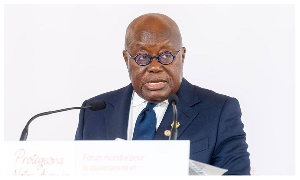There have been threats by the European Union (EU) to place a ban on the exportation of cocoa from Ghana should the negative impacts of illegal mining, which are contributing to the destruction of the country’s environment, persist.
Speaking at the two-day National Consultative Dialogue on Small Scale Mining in Accra, the Deputy Chief Executive in-Charge of Agronomy and Quality Control at COCOBOD, Dr. Emmanuel Agyemang Dwomoh, expressed fears about the impact of the development on Ghana’s cocoa sector, reports citinewsroom.com.
Recent figures show that Ghana exports 80 percent of its cocoa to countries forming the European Union.
Dr. Emmanuel Agyemang Dwomoh however stated that there should be immediate actions taken to avoid any such sanction from the EU in the future.
“As we speak, EU is threatening to ban Ghana and Côte d’Ivoire, to impose legislative instrument restrictions on the importation of cocoa from Ghana and Côte d’Ivoire to their courts,” he revealed.
Further, he said the EU is considering this course of action because areas shown in satellite images to have been forested in the 70s and 80s in Ghana have all experienced some land degradation in recent decades.
He explained that, “When you take the satellite images, you will see those places in red. The EU thinks that all those places are red because cocoa is causing land degradation [in Ghana], meanwhile, it is as a result of the galamsey activities.”
Dr. Emmanuel Agyemang Dwomoh further raised concerns about the devastating effects of illegal mining activities on the production of cocoa in Ghana, as well as on its exportation.
“The impact of these mining activities on cocoa production is enormous. There is crop loss, reduction of crop yield and income, loss of vegetation, the fertility of the crop soil is destroyed and [there’s also] an early dropping of immature pods, as a result of the chemicals that they use,” he lamented.
The EU announced in January 2021 that it will contribute €25 million to enhance the economic, social and environmental sustainability of cocoa production in Côte d’Ivoire, Ghana and Cameroon, who are, respectively, the first, second and fifth-biggest cocoa producers globally.
This contribution is expected to generate almost 70% of the world production of the cash crop.
The citinewsroom.com report indicated that this funding is also to strengthen the partnership between Team Europe (composed of the EU, its Member States, and European financial institutions) and the three cocoa-producing countries and aims at ensuring a decent living income for farmers, halting deforestation and eliminating child labour.
General News of Thursday, 15 April 2021
Source: www.ghanaweb.com

















